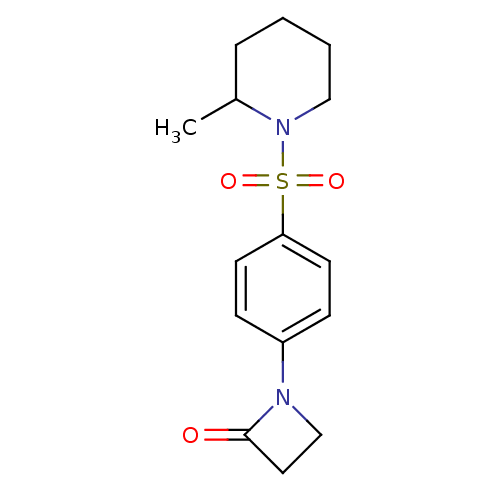BDBM50430709 CHEMBL2333532
SMILES CC1CCCCN1S(=O)(=O)c1ccc(cc1)N1CCC1=O
InChI Key InChIKey=VFNXADRXERYLBI-UHFFFAOYSA-N
Data 4 IC50
Activity Spreadsheet -- Enzyme Inhibition Constant Data from BindingDB
 Found 4 hits for monomerid = 50430709
Found 4 hits for monomerid = 50430709
TargetAldo-keto reductase family 1 member C3(Homo sapiens (Human))
University Of Auckland
Curated by ChEMBL
University Of Auckland
Curated by ChEMBL
Affinity DataIC50: 5.61E+3nMAssay Description:Inhibition of His-tagged human AKR1C3 expressed in Escherichia coli BL21 (DE3) assessed as inhibition of reduction of non-fluorescent ketone probe to...More data for this Ligand-Target Pair
TargetAldo-keto reductase family 1 member C4(Homo sapiens (Human))
University Of Auckland
Curated by ChEMBL
University Of Auckland
Curated by ChEMBL
Affinity DataIC50: >3.00E+4nMAssay Description:Inhibition of His-tagged human AKR1C4 expressed in Escherichia coli BL21 (DE3) assessed as inhibition of reduction of non-fluorescent ketone probe to...More data for this Ligand-Target Pair
TargetAldo-keto reductase family 1 member C1(Homo sapiens (Human))
University Of Auckland
Curated by ChEMBL
University Of Auckland
Curated by ChEMBL
Affinity DataIC50: >3.00E+4nMAssay Description:Inhibition of His-tagged human AKR1C1 expressed in Escherichia coli BL21 (DE3) assessed as inhibition of reduction of non-fluorescent ketone probe to...More data for this Ligand-Target Pair
TargetAldo-keto reductase family 1 member C2(Homo sapiens (Human))
University Of Auckland
Curated by ChEMBL
University Of Auckland
Curated by ChEMBL
Affinity DataIC50: >3.00E+4nMAssay Description:Inhibition of His-tagged human AKR1C2 expressed in Escherichia coli BL21 (DE3) assessed as inhibition of reduction of non-fluorescent ketone probe to...More data for this Ligand-Target Pair
